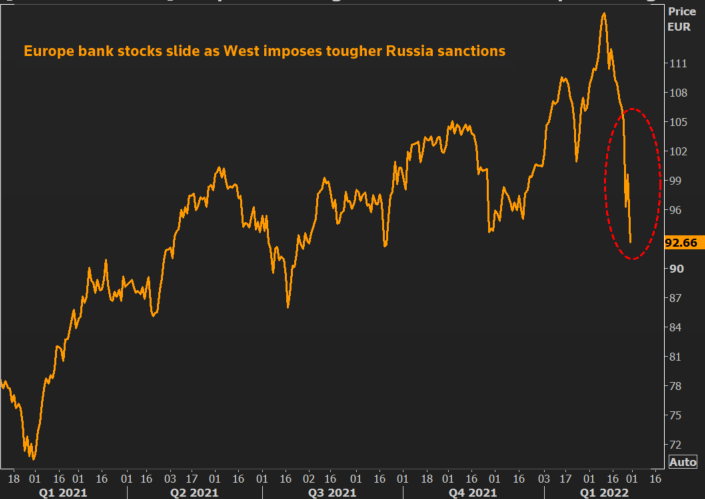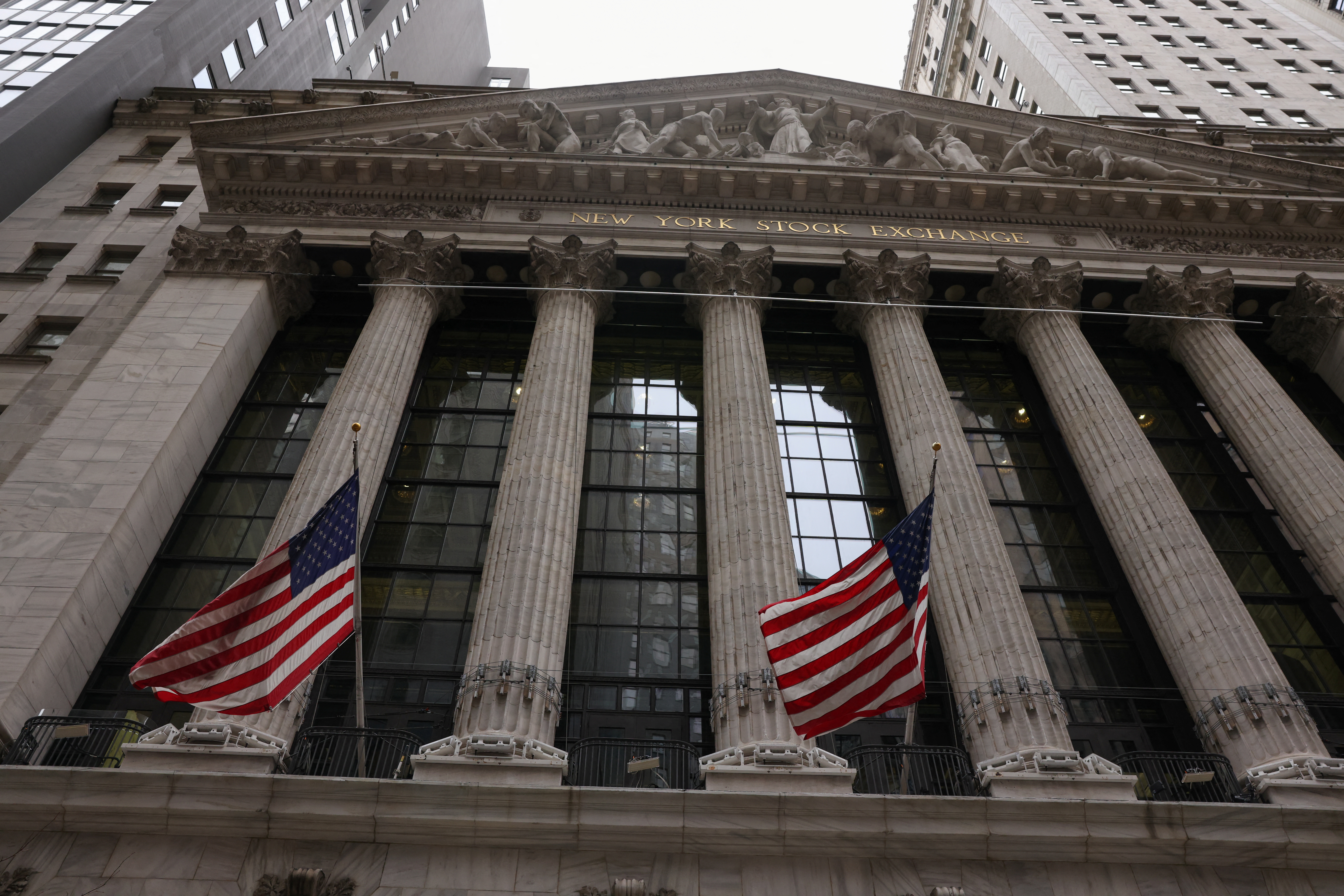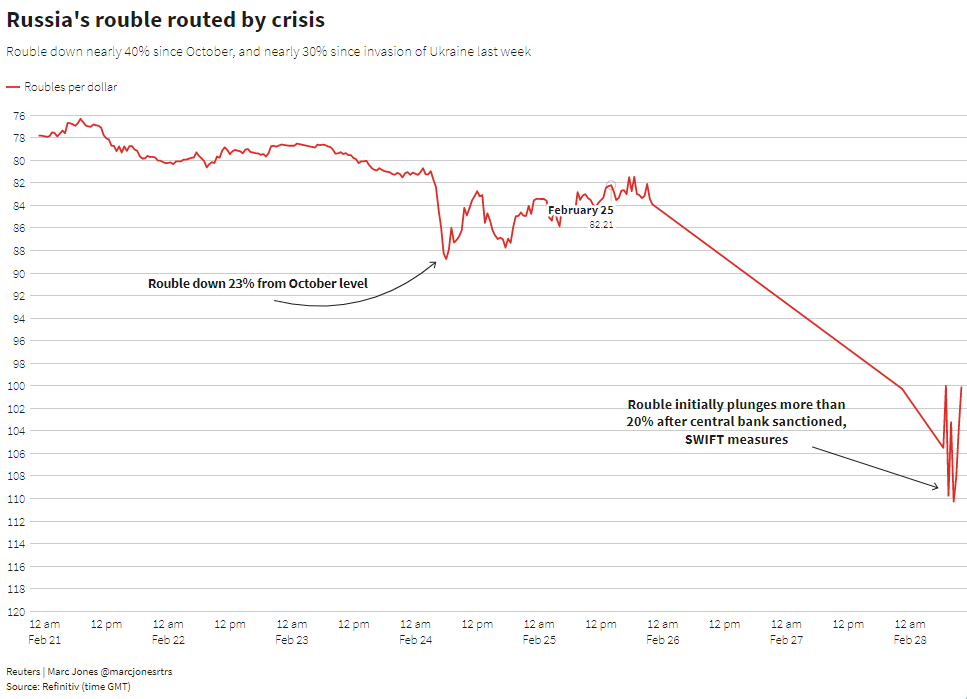NEW YORK/LONDON, Feb 28 (Reuters) – The Russian ruble fell to fresh record lows on Monday while world stocks slid and oil prices jumped, as the West ramped up sanctions against Russia over its Ukraine invasion, with steps including blocking banks from the SWIFT global payments system.
Russia’s central bank hiked its key interest rate to 20% from 9.5% to bolster the ruble and fight inflation. Authorities told export-focused companies to be ready to sell foreign currency as the ruble slid 32% before recouping about half its losses. read more
As an economic crisis loomed in Russia, the fallout of tougher sanctions from the West imposed over the weekend rippled across financial markets, especially in Europe, where the pan-regional STOXX 600 index slid 1.10%. read more
Register now for FREE unlimited access to Reuters.com
Register
European banks were hit hard, with those most exposed to Russia, including Austria’s Raiffeisen Bank (RBIV.VI), UniCredit (CRDI.MI) and Societe Generale (SOGN.PA), falling between 11 and 15%. The wider euro zone banking index (.SX7E) lost 6.80%

On Wall Street, the Dow Jones Industrial Average (.DJI) fell 0.93%, the S&P 500 (.SPX) lost 0.65% and the Nasdaq Composite (.IXIC) added 0.04% as investors bet the Federal Reserve won’t be so aggressive hiking interest rates. MSCI’s all-country world equity index (.MIWD00000PUS) was down 0.44%.
Markets are likely to remain choppy in the near term, analysts said. While valuations have fallen and some risks have been priced into the market, this is not a time to derisk, Solita Marcelli, chief investment office for the Americas at UBS Global Weather Management, said in a note to clients.
“Investors trying to trade off geopolitical events can easily get whipsawed,” Marcelli said, noting that sell-offs based on geopolitical events have been brief in the past.
Oil prices surged after Russian President Vladimir Putin put nuclear-armed forces on high alert on Sunday, the fourth day of the biggest assault on a European state since World War Two. read more
The ramp-up in tensions heightened fears that oil supplies from the world’s second-largest producer could be disrupted, sending Brent crude futures up 2.9% to $100.77. U.S> futures rose 4.35% to $95.57 per barrel after hitting their highest since 2014 last week. read more
The global economy faces significant economic and financial turmoil in Russia, the world’s 11th largest economy, that will spill across its borders, analysts warned.

Even if Western governments allow oil and gas purchases from Russia, markets need to digest unavoidable disruption to hedging contracts, insurance coverage and energy markets, said Christopher Smart, chief global strategist at Barings Investment Institute.
“If Russian entities are effectively blocked from exchanging their money into the world’s reserves currencies, will the Russian government allow the foreign debts to be paid?” he said.
SAFE-HAVENS SHINE
As uncertainty continued to grip markets, investors sought the safety of the dollar, Swiss franc and Japanese yen.fell 0.406%
The euro fell 0.43% to $1.1218, while the yen strengthened 0.18% at 115.33 per dollar.
Sovereign bonds such as the U.S. Treasuries and German Bunds – regarded as among the most safest assets to hold globally – remained in strong demand.
The 10-year Treasury yield was down 11.1 basis points to 1.873% and equivalent German yields were down 2 basis points to 0.203% .
Money markets continued to push back rate hike expectations with investors now pricing roughly 30 basis points worth of tightening from the European Central Bank in total this year, down from 35 bps late last week. read more
Gold rose 1.45% to around $1,915.00.
MSCI’s Russia equity index slid 20.7% (.MIRU00000PUS), while London and Frankfurt-listed Russian equity exchange traded funds (ETFs) tanked between 20% and 38% (XMRC.DE), (CSRU.L), (HRUB.L) as investors dumped Russian assets.

Register now for FREE unlimited access to Reuters.com
Register
Reporting by Herbert Lash, additional reporting by Dhara Ranasinghe and Elizabeth Howcroft in London, Kevin Buckland in Tokyo; Editing by Jason Neely and Hugh Lawson
Our Standards: The Thomson Reuters Trust Principles.
